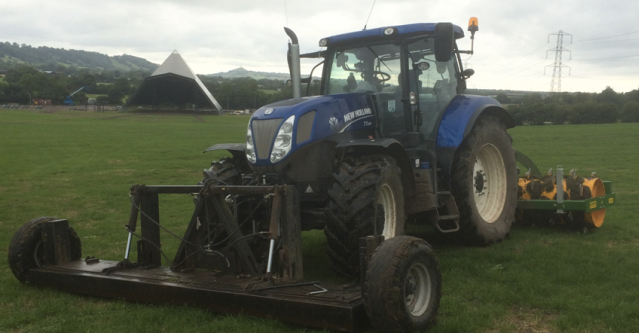
This month John Taylor, herd manager at 2014 NMR/RABDF Gold Cup winners Worthy Farm in Somerset, reflects on the aftermath of the recent Glastonbury festival held on the farm.
Firstly I should congratulate Neil Baker on winning the 2015 Gold Cup—at least it stays in Somerset. I know how disappointed he was last year, as he came and had a chat after our win.
At least now I will finally get a chance to see his unit, which everybody says is truly outstanding, and has taken large herd management to new levels.
Well our TB test was going great—not a pimple on anything—and we had the last batch of milking cows in the race when lo and behold a cow with a lump. So all our hopes of a second clear test were out of the window. We are about to take over another farm, so hopefully Defra will still let us put stock on there, even if we have to use it as an ‘isolation unit’.
We are already overstocked, but we have a lot more to calf this autumn than last year and most are in-calf to sexed-semen. The original plan was to sell some youngstock if we got too many, but we are now having to keep our Angus calves as well.
Showing cows on hold
The only good thing is that Mr Eavis wanted me to take some cows to the Mid-Somerset show, so at least I’ve got out of that! I personally would like to do a bit of showing, but it is so time consuming, and it has very little financial benefit as most of the expensive cows are now high genomic cows.
Talking of genomics, we have tested twenty calves and it will be interesting to see how accurate they are to the PLI. We have been using all genomic semen for at least three years now and I am really pleased with the quality of heifers calving in, especially the type as we have moved our focus to productive life and daughter pregnancy rates. I think it is a must to breed healthier cows as I can see restrictions on drug usage coming in the future, and it is better to be proactive rather than reactive.
We have tweaked our rations slightly as our maize silage was going too fast, and seeing as we had plenty of first cut silage, we cut the maize back a little. I also thought it would save us buying in any maize. Our milk proteins have dropped slightly since, and cows are certainly not bulling so strong. We have had our first LDA for nine months, and drenched a couple of other fresh calves. So I have decided to buy 100 tonnes of crimped maize, and feed two kilos per day to stretch out the maize silage.
I could say that this is all down to feeding straw, and in my own mind I am sure it has not helped. Hopefully at some point we have 80 acres of big bale hay to make, weather permitting. If not we will make big bale silage.
Cows ignore festival
I have never known our cows take so little notice of the Glastonbury festival, as usually on the three days of music one or two get a bit spooky. But they just took it in their stride and carried on like it was just another day, and the milk only dipped very slightly. I think a lot of this is down to having all the youngstock on site now—they get used to all the weird and wonderful noises of Glastonbury.
I only wish I could say the same, but three days without much sleep is no good for nobody. Pam actually got to go see some of the festival on the Friday. Unfortunately she picked the wrong day, as by the time she got home she was soaked! Luckily it dried up after that, so not too much damage was done to the fields.
It is now two weeks since the festival, and the clean-up operation has gone really well this year. It is amazing to look out of my bedroom window and watch the festival build up for three or four weeks, and then watch it disappear again in two weeks. It has certainly changed in the last 16 years that we have been here, and it just seems to be getting bigger, and better organised each year.
When I think back to some of the things that we used to have to put up with, like people actually getting in the yards with the cows, and a few idiots high on something actually trying to jump in the slurry pit (which during the festival used to store the human waste). It was not a pleasant smell, especially when the weather got hot. We even had an animal rights activist trying to let all the calves out with the milking cows, and when I tried to stop him he went berserk—he was obviously high on something.
Field clean up begins
We have now started to tine harrow all the grazing fields so that this loosens up any metal left behind, and then run over all the fields with the magnet with an aerator following along to break up any compaction. It is all GPS controlled now, so nothing gets missed. We used to get a bit of metal on our Keenan Wagon magnets, but these days it’s very rare to see any. It has taken many years to get this right—but hopefully we have sorted it, and for this I should thank Steve our farm manager, and his team of Brad, Jack and Andy.
